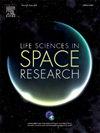睡眠剥夺和淋巴系统功能障碍是长时间太空飞行中SANS的危险因素
IF 2.8
3区 生物学
Q2 ASTRONOMY & ASTROPHYSICS
引用次数: 0
摘要
一种独特的眼部结构变化和视觉异常,被称为航天相关神经-眼综合征(SANS),在长时间的航天飞行后影响了70%的机组人员。目前关于SANS病因的假说讨论了头部液体移位和静脉充血,这与颅内压(ICP)升高和血管周围间隙(PVS)扩大有关。这些PVS包括淋巴系统(GS),这是最近发现的中枢神经系统(CNS)中脑脊液(CSF)和代谢物的流入和流出途径网络。淋巴清除和传统意义上理解的脑脊液循环都受到睡眠-觉醒周期的影响,在睡眠期间显示出液体流动的显著增加。在动物实验中,自然睡眠与间质空间增加60%有关,这可能会增强GS的交换和流出。使用对比增强MRI对人类进行的相应研究表明,与清醒相比,睡眠具有更大的淋巴清除率。宇航员在长时间太空飞行中的睡眠问题已经得到了充分的记录,从睡眠中断、质量下降到睡眠时间不足。最近的地面研究提供了证据,表明睡眠剥夺会损害人类大脑的分子清除,因此,类似的淋巴功能障碍可能会因宇航员的这些情况而出现。因此,除了在长时间的太空任务中损害机组人员的工作表现外,睡眠剥夺还可能通过降低淋巴效率和清除能力而对神经-眼产生长期影响。由此产生的认知和视觉障碍的不利影响对宇航员的未来表现构成了重大风险。这项工作讨论了关于昼夜节律紊乱和淋巴紊乱之间的联系作为SANS发展的潜在促进机制的现有文献。这种关联应该作为SANS的潜在危险因素在未来的研究中得到重点关注。此外,提高外太空睡眠质量和持续时间的干预措施可能被证明是预防这种综合征的实际对策。本文章由计算机程序翻译,如有差异,请以英文原文为准。
Sleep deprivation and glymphatic system dysfunction as a risk factor for SANS during long-duration spaceflight
A unique constellation of ocular structural changes and visual anomalies known as Spaceflight Associated Neuro-ocular Syndrome (SANS) affects 70 % of crew members after long-duration spaceflight. Current hypotheses regarding the etiology of SANS discuss cephalad fluid shifts and venous congestion, which are correlated with elevated intra-cranial pressure (ICP) and enlarged perivascular spaces (PVS). These PVS comprise the glymphatic system (GS), a recently discovered network of influx and efflux pathways for cerebrospinal fluid (CSF) and metabolites in the central nervous system (CNS). Both glymphatic clearance and traditionally understood CSF circulation are affected by sleep-wake cycles, displaying a significant increase in fluid flow during sleep. Natural sleep has been associated with a 60 % increase in interstitial space in animal studies, which likely enhances GS exchange and outflow. Corresponding studies in humans using contrast-enhanced MRI associate sleep with greater glymphatic clearance compared to wakefulness. The sleep problems of astronauts during long-duration spaceflight have been well documented, ranging from sleep disruption and decreased quality to insufficient sleep duration. With recent terrestrial studies providing evidence that sleep deprivation impairs molecular clearance from the human brain, it follows that similar glymphatic dysfunction may arise due to these conditions in astronauts. Thus, in addition to impairing crew member work performance on long-duration space missions, sleep deprivation may exert long-term neuro-ocular effects via decreased glymphatic efficiency and clearance. The adverse impact of the resulting cognitive and visual disturbances presents a major future performance risk to astronauts. This work discusses the existing body of literature regarding the connections between circadian disruption and glymphatic disruption as a potential contributing mechanism for the development of SANS. This association should receive focused attention in future research as a potential risk factor for SANS. In addition, interventions that enhance extraterrestrial sleep quality and duration may prove to be practical countermeasures for the prevention of this syndrome.
求助全文
通过发布文献求助,成功后即可免费获取论文全文。
去求助
来源期刊

Life Sciences in Space Research
Agricultural and Biological Sciences-Agricultural and Biological Sciences (miscellaneous)
CiteScore
5.30
自引率
8.00%
发文量
69
期刊介绍:
Life Sciences in Space Research publishes high quality original research and review articles in areas previously covered by the Life Sciences section of COSPAR''s other society journal Advances in Space Research.
Life Sciences in Space Research features an editorial team of top scientists in the space radiation field and guarantees a fast turnaround time from submission to editorial decision.
 求助内容:
求助内容: 应助结果提醒方式:
应助结果提醒方式:


